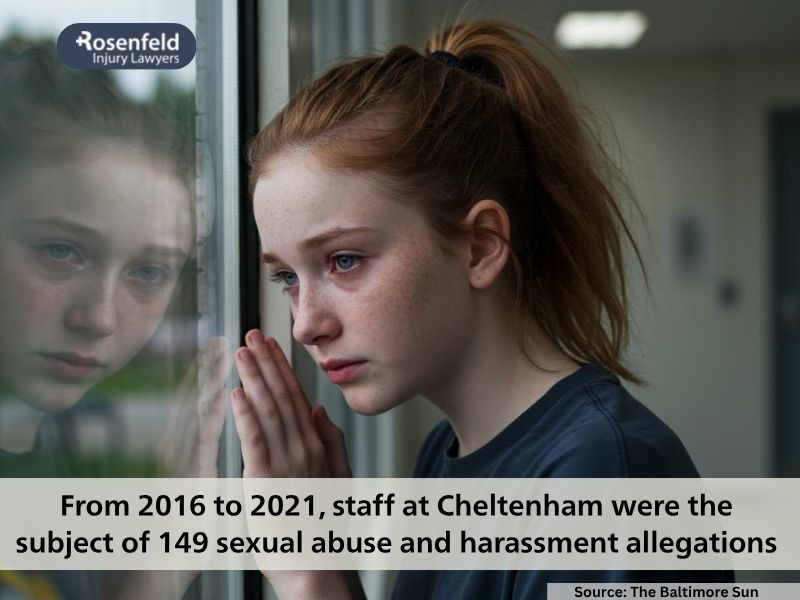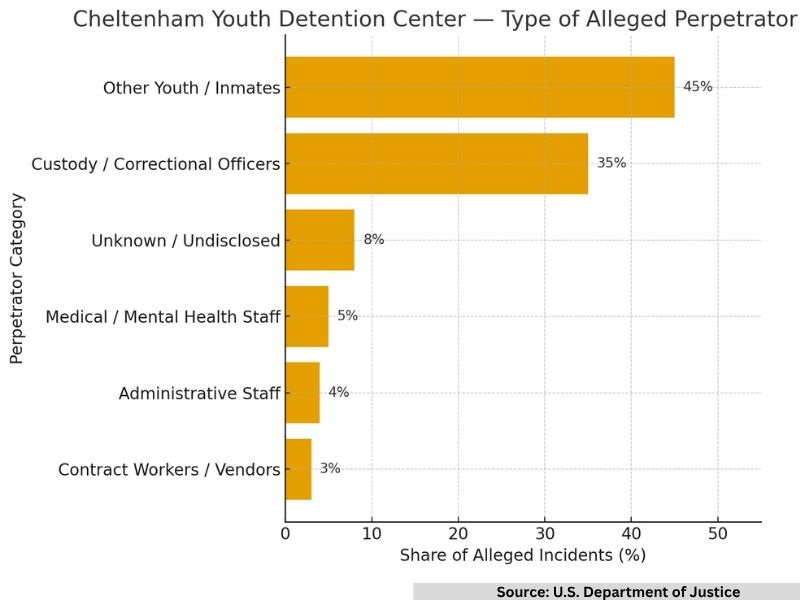Cheltenham Youth Detention Center Sexual Abuse Lawsuits
Compensation for Victims of Child Sexual Abuse
Survivors of Cheltenham Youth Detention Center sexual abuse have the right to pursue financial compensation for the harm they endured. At Injury Lawyer Team, we help victims of childhood abuse file Maryland juvenile detention sexual abuse lawsuits to recover damages for therapy, medical costs, emotional distress, and lost opportunities.
Our firm is committed to seeking justice and holding state agencies, staff, and other responsible parties accountable.

Abuse Allegations Involving Cheltenham Youth Detention Center
For decades, survivors have alleged that the Cheltenham Youth Detention Center in Prince George’s County, Maryland, exposed boys to sexual exploitation, coercion, and physical brutality while in state custody.
Opened in 1870 and long known as the Cheltenham School for Boys and later Boys’ Village of Maryland before becoming the Cheltenham Youth Facility and today’s CYDC, the institution has been repeatedly cited in lawsuits and investigations for mistreatment and sexual abuse of vulnerable youth.
In March 2025, major media outlets reported that 99 former Cheltenham residents filed a lawsuit alleging staff-on-youth sexual assaults and coercion spanning from 1969 through 2018.
One named survivor, Kenneth Lee Gardner, said he was just 11 years old when he arrived at Cheltenham and was forced into sexual abuse, including being made to perform sexual acts in exchange for food, by adults responsible for his care. Plaintiffs describe assaults in showers and other secluded areas, threats, and retaliation if they reported abuse.
Long before today’s lawsuits, federal investigators singled out Cheltenham.
In April 2004, the U.S. Department of Justice publicly faulted Maryland for “substantial civil-rights violations” at juvenile facilities, including Cheltenham, and contemporaneous reporting documented allegations that some female employees engaged in inappropriate sexual relationships with youths, alongside beatings and other violence.
Those federal findings led to a settlement with the state in 2005. While the DOJ letter addressed multiple harms, the sexual relationship allegations at Cheltenham underscored a pattern of staff sexual abuse dating back decades at that specific campus.
As of the most recent coverage, no Cheltenham-only jury verdicts or published settlement amounts have appeared in the press. The ninety-nine-plaintiff Cheltenham Youth Detention Center case and other Cheltenham-named sex abuse lawsuits remain active in Maryland courts, with the state and the Department of Juvenile Services contesting aspects of the pleadings while survivors press forward.
Taken together, federal findings referencing Cheltenham, survivor accounts naming Cheltenham, and facility audits at Cheltenham portray a consistent through-line: youth at this facility describe being sexually abused by staff entrusted with their care, often in tandem with violence and intimidation. For many, sexual abuse took place years ago, yet the trauma, lost opportunities, and emotional toll persist.
Survivors who experienced abuse at Cheltenham now have a clearer record to point to: specific names and dates in public reporting, a multi-plaintiff complaint tied to this campus, and a documented paper trail showing how Cheltenham is supposed to respond when sexual contact or exploitation is alleged.
What Is Considered Sexual Abuse Under Maryland Law?
When we handle youth detention center sexual abuse cases, we use Maryland’s legal definitions to guide our strategy.
Under Md. Code Criminal Law § 3-602, child sexual abuse includes any sexual act or sexual contact with a person under 18 by someone responsible for their care or supervision, exactly the role detention center staff hold.
Md. Code Criminal Law § 3-308 makes it a crime for anyone in a position of authority to engage in sexual contact with a minor under their supervision.
On the civil side, Md. Courts & Judicial Proceedings § 5-117 now allows child victims to file claims at any time, regardless of how long ago the abuse occurred, and provides higher damage caps in certain cases.
Together, these laws empower survivors of Cheltenham sexual abuse and other Maryland juvenile facilities to seek justice and hold abusers and institutions accountable.
What Damages Can Sexually Abused Victims Recover in Civil Lawsuits?
Survivors bringing youth detention center sexual abuse lawsuits can pursue a wide range of damages designed to address the full impact of what they endured, including:
- Therapy and Counseling Costs – ongoing psychiatric care, trauma therapy, medications, and related mental-health services.
- Medical Expenses – treatment for physical injuries, sexually transmitted infections, and other health effects from the abuse.
- Emotional Distress – compensation for PTSD, anxiety, depression, and other psychological conditions tied to the abuse.
- Lost Educational Opportunities – disrupted schooling, delayed graduation, or loss of scholarships caused by detention and trauma.
- Lost Wages or Earning Capacity – diminished future income resulting from the long-term impact of childhood abuse.
- Loss of Enjoyment of Life – harm to personal relationships, social functioning, and quality of life.
- Punitive or Exemplary Damages – additional sums to punish and deter especially reckless or abusive institutional conduct.
- Other Out-of-Pocket Costs – travel, relocation, or security expenses linked to ongoing safety concerns or therapy.
Our team uses these categories within your legal rights to build comprehensive damage models that reflect the true cost of sex abuse in detention settings and help survivors secure meaningful relief.
Who Can Be Held Liable in a Lawsuit Against a Juvenile Detention Center?
In lawsuits arising from abuse inside Maryland’s youth detention centers, identifying every responsible party is crucial. These cases often involve more than just the individual perpetrator, like a guard or other inmate. Institutions and supervisors may also be accountable for systemic failures they allowed to go on unreported.
Potentially liable parties include:
- Individual Staff Members – guards, counselors, nurses, teachers, contractors, or volunteers who directly committed or enabled the abuse.
- Supervisors and Administrators – facility leadership who ignored complaints, failed to implement safeguards, or covered up abuse.
- State Agencies – such as the Maryland Department of Juvenile Services or other government bodies responsible for oversight, hiring, and training.
- Third-Party Contractors – private companies providing healthcare, education, or security inside the detention center whose employees harmed or failed to protect youth residents.
- Outside Institutions or Affiliates – entities like churches, nonprofits, or other groups working with the facility that may have provided access to minors.
- Insurers or Surety Providers – depending on policy language, insurers may be named to cover damages arising from negligent hiring, supervision, or failure to protect.
By naming all responsible parties, survivors strengthen their cases and increase the chance of meaningful accountability. Our team is experienced in tracing responsibility across multiple layers of supervision and filing lawsuits on behalf of abused youth.
How Long Do Survivors Have to Take Legal Action Under the Maryland Child Victims Act?
One of the most important changes for survivors of abuse in Maryland youth detention facilities is the Maryland Child Victims Act (SB 686 / HB 1, Ch. 5, Acts of 2023).
Effective October 1, 2023, this law eliminates the statute of limitations and statute of repose for civil actions related to child sexual abuse. In other words, survivors can now file civil lawsuits, no matter how long ago the abuse occurred, to pursue justice and compensation.
Before this reform, many child victims were barred by a strict statute of limitations for civil sexual abuse cases, often leaving them without recourse even when strong evidence existed.
Now, survivors who were abused decades ago in detention centers, schools, or other institutions can finally file claims and have their cases heard on the merits. This reform also allows for higher damage caps in certain circumstances, reflecting the seriousness of childhood sexual abuse and institutional responsibility.
For our clients, this means we can move forward with claims arising from abuse that happened years ago, build a sexual abuse lawsuit based on historical records, and bring legal action to hold agencies and individuals accountable. Our team helps survivors navigate the process of coming forward, preserving evidence, and filing their claims under the new legal landscape.

How Injury Lawyer Team Can Help
Our firm has extensive experience handling sexual abuse lawsuits in Maryland, including cases involving abuse in youth detention facilities.
We understand how to investigate historical records, subpoena state agencies, and uncover patterns of misconduct that may stretch back decades. Our attorneys use trauma-informed practices to work with survivors, preserving their dignity and privacy at every stage of the case.
We provide a full suite of services for survivors: conducting confidential interviews, gathering and analyzing records, coordinating expert testimony, and pursuing every responsible party, from individual staff members to state agencies and contractors.
We also help document therapy and medical costs, lost educational opportunities, and long-term physical violence and emotional harm to ensure claims fully reflect the survivor’s experience. We handle the legal process from start to finish so you can focus on healing while we focus on obtaining justice and financial compensation.
Book a Free Consultation
If you or someone you love experienced sexual abuse in a Maryland juvenile detention center, you don’t have to face this alone. Injury Lawyer Team offers free, confidential consultations so you can explore your legal options without obligation. We work on a contingency fee basis, meaning you pay nothing unless we win your case.
Take the first step toward accountability and healing by reaching out today. Learn more about how we handle sexual abuse lawsuits and contact us directly to schedule your free consultation with an experienced attorney.
All content undergoes thorough legal review by experienced attorneys, including Jonathan Rosenfeld. With 25 years of experience in personal injury law and over 100 years of combined legal expertise within our team, we ensure that every article is legally accurate, compliant, and reflects current legal standards.








